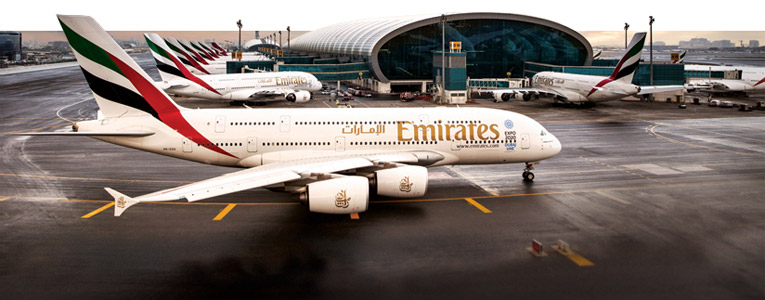This post may contain links from our sponsors and affiliates, and Flywheel Publishing may receive
compensation for actions taken through them.

There is essentially one key customer for the plane, Dubai-based Emirates, which has taken delivery of 59 of the planes and has an order in for 81 more. Airbus has written a total of 317 orders for the super-jumbo jet through the end of March and delivered 156 since the aircraft was introduced in 2005. Airbus delivered two A380s in March.
However, Airbus has not taken a new order for the plane since 2013, and Airbus’s CEO said earlier this month that the plane may have been launched 10 years too early. Maybe — or maybe not.
Boeing Co. (NYSE: BA) owned the jumbo jet market for decades with its 747. But the U.S. company has begun to cut production from around 2.0 per month in 2013 to about 1.3 per month by next year. Boeing did not take a new order for the passenger version of the 747 in all of 2014 and has not taken one to date this year. The company wrote orders for two new 747-8F freighters in 2014 and an order for three of the freighters in February of this year.
Part of the reason for the lack of airline interest in the huge planes is the belief, probably created by the aircraft makers themselves, that the new, more fuel-efficient dual-engine, wide-body planes like the 787 and the A350 are more economical to operate than four-engine planes like the 747 and the A380. The analysts at Leeham News and Comment, however, say that the A380 is “the most economical aircraft one can operate if one can fill it to normal load factors.”
ALSO READ: Emirates Snubs GE, Pratt & Whitney in $9.2 Billion Order
According to Air Transport World, the highest load factor for the first three months of 2015 was 86.8%, and the 25th best was 78.7%. For the sake of argument then, let’s say a load factor of around 80% is “average.” Using 80% of an A380’s capacity range, we get a capacity range of 420 to around 650. The A380 has a flight range of 8,200 nautical miles (nm).
If Boeing has a counteroffer to the A380, it is the dual-engine, wide-body Boeing 777-9X, which will not be available for delivery to customers until 2020. The 9X can carry up to 400 passengers a distance of 8,200 nm. The smaller 777-8X will seat 350 passengers and fly them up to 9,300 nm.
Boeing’s 787 in a three-class configuration has a capacity of 242 to 335 and a range of around 7,000 nm, while the A350-1000, the largest of that family, carries up to 369 passengers in a two-class configuration with a range of about 8,000 nm.
Boeing did such a good job of selling the 777X that Emirates cancelled an order for 70 A350s last July and finalized an order for 150 of Boeing’s 777X jets, adding the rights to acquire another 50 of the planes.
Emirates also wants Airbus to put more fuel-efficient engines on the A380 and could place an order for up to 200 of the so-called A380neos, if Airbus will build it. The aircraft maker’s CEO has said that the company will “one day launch an A380neo and one day launch a stretched A380.” He did not name the day, and he may never do so, even though an order for 200 would be a big enticement.
ALSO READ: How Analysts Rate Boeing After Earnings
Boeing believes it has a solid competitor — in terms of operating costs — to the A380 in the new 777X family. Boeing simply does not see a large market for jumbo jets. Even though the 747 was first delivered to a customer in 1970, if a plane of that size and capability were still in demand, there would be some new orders. But with none for more than a year and none in the same period for the A380, Boeing seems to have made the right bet on this one.
Get Ready To Retire (Sponsored)
Start by taking a quick retirement quiz from SmartAsset that will match you with up to 3 financial advisors that serve your area and beyond in 5 minutes, or less.
Each advisor has been vetted by SmartAsset and is held to a fiduciary standard to act in your best interests.
Here’s how it works:
1. Answer SmartAsset advisor match quiz
2. Review your pre-screened matches at your leisure. Check out the advisors’ profiles.
3. Speak with advisors at no cost to you. Have an introductory call on the phone or introduction in person and choose whom to work with in the future
Get started right here.
Thank you for reading! Have some feedback for us?
Contact the 24/7 Wall St. editorial team.


